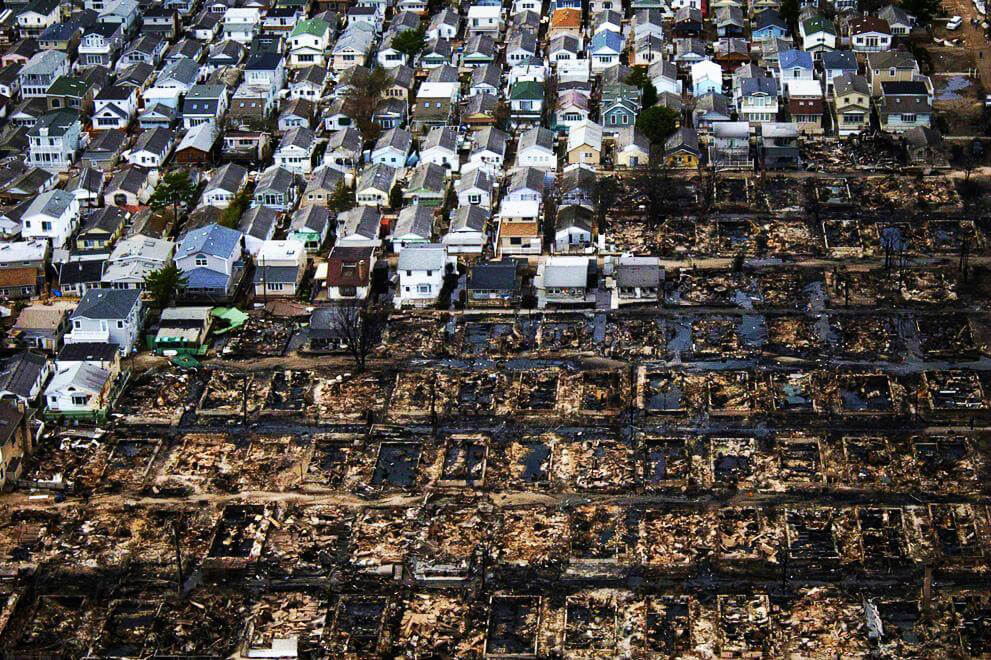It was a lasting image seen around the world after Superstorm Sandy slammed into the Rockaway peninsula in October 2012. The seaside bungalow community engulfed in flames in a massive blaze that destroyed more than a hundred homes.
This week, Queens County Supreme Court Justice Bernice Siegal ruled that the Long Island Power Authority and National Grid were thoroughly negligent in their lack of preparation for the storm that hammered New York City by abandoning their electrical equipment while keeping it fully energized as the Rockaway Peninsula was underwater. This resulted in three separate massive electrical fires that burned unattended throughout the night.
By daybreak, more than 150 homes and businesses were burned completely to the ground resulting in property damage exceeding $100 million, an estimate offered by the defendant’s themselves in a prior court filing.
After six years of extensive litigation, the ruling now clears the way for a jury trial to commence later this year. According to court filings, this is the second motion filed by the defendants which attempted to avoid a jury trial and have the case dismissed.
The prior motion was appealed by the defendants all the way to the Court of Appeals, which also rejected the defendant’s arguments for dismissal on other grounds than those filed in the summary judgement motion decided this week.
The lawsuit alleges that while LIPA was entrusted with the duty and responsibility to distribute electricity, they passed that responsibility off to National Grid by paying them an annual base fee of $224 million with several added incentive bonuses for each hour they operated electrical transmissions. Shortly after the storm, Governor Cuomo transferred the task of transmitting and distributing electricity on Long Island and the Rockaway Peninsula to PSE&G, a publicly traded energy company headquartered in New Jersey.
In rejecting the defendant’s attempt to dismiss the lawsuit, the court stated that “The defendants who provided electricity to areas known to be vulnerable to storm surges, could have, and should have, promulgated written protocols for storm deenergization.” She further ruled that, “the plaintiff’s eviscerated” the defense reliance on a “relic” law left over from 1886 and had no application in the current lawsuit.
Plaintiffs’ attorney Keith Sullivan of Sullivan & Galleshaw, LLP, stated, “If LIPA and National Grid acted responsibly in preparing for the storm, my clients would not have suffered the heartache of losing their homes, businesses, all of their life possessions and the communities would not have looked like war-zones after the storm passed through. The defendants showed a total disregard for our clients’ health and safety. Industry protocol and common sense called for shutting down the electric system. Sadly, LIPA and National Grid chose to keep the dangerous electric flowing into the very small narrow communities that are completely surrounded by water without any monitoring of the lethal electricity as the surging tides and violent wind barreled into the community.”
In ruling against the defendants request to sever the trial into three separate trials according to each fire location, the court held “… there are common questions of law and facts as evidenced by Defendants’ own motions … further, the interests of judicial economy and consistency of verdicts will be served by having a single trial.”
Sullivan added, “Unquestionably, the court reached the right decisions on both fronts. The motion for three separate trials was nothing more than a failed effort by the defendants to challenge our resolve and try to harm our clients financially by running up the costs and time by three-fold. We will not waiver at all. Sadly, while our clients still struggle, the corporate defendants with unlimited financial resources, chose to spend six years pushing meritless defenses.”
National Grid disagrees with the court’s decision and intends to pursue an appeal, according to a statement saying, “National Grid maintains that it at all times managed and operated the electrical system on the Rockaway Peninsula in a reasonable and prudent manner.”
Attorney Zachary Murdock of Lazer, Aptheker, Rosella & Yedid, P.C., the outside counsel to LIPA, also disagreed with the court’s ruling and intends to appeal.
“We believe that keeping the power on to critical care facilities, first responders, and customers’ homes in the Rockaways was both sensible and consistent with prudent utility practice.,” Murdock said. “We look forward to presenting our position at trial.”

































